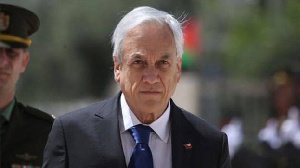
Sebastián Piñera
SANTIAGO, May 16 (NNN-AGENCIES) — Chileans head to the polls Sunday in a second day of voting to elect 155 people who will rewrite the country’s dictatorship-era constitution in a bid to address deep-seated social inequality that gave rise to deadly protests in 2019.
Some 14 million people are eligible to vote this weekend in what many consider to be Chile’s most important election since its return to democracy 31 years ago.
More than three million people, or approximately 20.4 percent of the electorate, cast their ballot Saturday, according to the country’s Electoral Service.
“I hope that we have a constitution that captures the soul of our nation,” President Sebastian Pinera said after casting his ballot in the capital Santiago.
Chile’s constitution dates from 1980, enacted at the height of dictator Augusto Pinochet’s 1973-1990 rule, and is widely blamed for blocking equitable progress in a country ranked as one of the most unequal among advanced economies.
This inequality was one of the main drivers of the October 2019 protests, resulting a month later — after 36 deaths — in the government agreeing to a referendum on a new constitution.
That plebiscite, initially scheduled for April 2020 but delayed due to the coronavirus pandemic, finally took place on Oct 25 last year.
And the outcome was unequivocal: 80 percent voted for a new constitution to be drawn up by a body made up entirely of elected members.
This weekend, more than 1,300 candidates are in the running to become a part of history.
In a world first, half the candidates are — by design — women.
This will also be the case for the 155-member drafting group, which will have nine months to come up with a new founding law for Chile, which will be approved or rejected next year in a mandatory national vote.
Seventeen seats on the constitution-writing “convention” are reserved for indigenous representatives.
Voters will this weekend also elect regional governors, mayors and local councilors — usually a litmus test for presidential elections, next due in November.
Campaigning has been complicated amid a Covid-19 outbreak that has resulted in more than 1.2 million cases and nearly 30,000 deaths in the country of 19 million people, with the election’s two-day format decided upon due to the pandemic.
Chile has one of South America’s highest vaccination rates, with more than 48.5 percent of the 15.2 million targeted inhabitants having received two doses to date.
The country has the highest per capita income and the third most multimillionaires in Latin America. But the working and even upper-middle classes live with heavy debt, often to pay for schooling and private pensions.
An OECD report in February said “persistently high inequality” was a key challenge for Chile, with 53 percent of households classed as economically vulnerable and the poorest 20 percent of households earning a mere 5.1 percent of total income.
There is a low level of satisfaction with quality of life. — NNN-AGENCIES





